France, against its adversaries and its allies-16
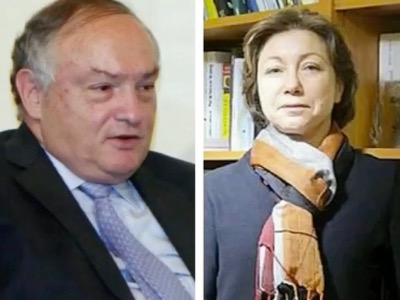
We continue the publication in episodes of Thierry Meyssan’s book, Before Our Very Eyes. Pursuing its neo-colonial dream without taking into account the realities, France is largely disowned by the Syrian People, then sidelined by its US allies before falling victim to its Turkish ally.
The Syrian people speak out
While Bassma Kodmani, the spokeswoman for the “Syrian opposition” – and companion of former French secret service director Jean-Claude Cousseran – had declared that “the regime is incapable of organizing a presidential election [and that] this is proof that it is a dictatorship,” a new electoral code was adopted – in accordance with Western standards – and the election was called.
Until then, the President had been appointed by the Baath party and then validated by referendum. For the first time, he would be elected by direct universal suffrage. It was unlikely that the National Coalition of Opposition and Revolutionary Forces would put forward a candidate, not because of the requirement that candidates have lived in Syria for the past ten years, but because the armed groups are violently opposed to democracy. In their view, as the Muslim Brotherhood has put it, “The Koran is our constitution” and any election is illegitimate. There is therefore no doubt that the regime’s candidate will be elected. However, his eventual legitimacy will depend not on the percentage of votes cast in his favour, but on the number of votes cast and their representativeness in relation to the entire population.
To sabotage the election, everything had to be done to prevent those Syrians who wanted to participate from doing so. Out of 22 million Syrians, less than 2 million lived in the “liberated areas” and would therefore not participate in the election. Another 2 million were refugees in Jordan, Lebanon, Turkey and Europe. France succeeded in convincing its European partners to follow suit and to prohibit the holding of polling stations in Syrian consulates, in violation of the Vienna Convention of April 24, 1963. The Conseil d’Etat, seized by refugees of this abuse of power [1], declared itself incompetent. Meanwhile the “Friends of Syria” denounced a “parody of democracy” aimed at “continuing the dictatorship”.
The election pitted three candidates against each other: the communist Maher el-Hajjar, the liberal Hassan Al-Nouri and the Baathist Bashar el-Assad. The state provided them with the means to campaign and guaranteed their security. The media gave them a voice. In reality, if the voters followed the proposals of both sides with interest, Bashar al-Assad was in a situation comparable to that of de Gaulle in 1945. The choice was to stand behind him for the survival of the Syrian Arab Republic or not to vote and side with the jihadists.
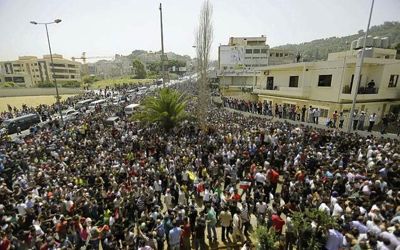
- More than 100,000 Syrian refugees gathered around the Syrian embassy in Beirut to elect their president, despite opposition fatwas and Western warnings, according to Lebanese General Security.
Before the ballot opened in Syria, refugees who wished to do so were invited to vote. Western propaganda convinced Syrians that the refugees were all “opponents”. Yet, when questioned, most assured that they did not leave their homeland “because of the dictatorship,” but because of the fighting. On May 28 and 29, 2014, the vote in Lebanon, where it was authorized at the embassy, moved a crowd of at least 100,000 people according to the Lebanese General Security, which blocked the entire capital. The army intervened to disperse the crowd, but it came from all over the country. Overwhelmed, the embassy had to extend the hours and dates of the vote. It was a nice surprise for Syrians in Syria and a shock for Western chancelleries [2].
In the end, despite calls for a boycott, 73.42% of Syrians of voting age went to the polls [3]. 360 foreign media, present on the spot, and all the embassies opened in Damascus attest to the regularity of the election. Bashar al-Assad obtained 10,319,723 votes, or 88.7% of the votes cast and 65% of the voting age population. The liberal candidate Hassan Al-Nouri obtained 500,279 votes, and the communist Maher el-Hajjar 372,301 votes.
During this campaign, France and its allies, pushed by Jeffrey Feltman, tried to have the Security Council recognize the jurisdiction of the International Criminal Court in the Syrian civil war. Of course, the draft resolution referred to all the Syrian actors, both the Republic and the jihadists, but could have anticipated that the prosecutor, Fatou Bensouda, would act as her predecessor Luis Moreno Ocampo had done in Libya: at the behest of Nato.
This draft resolution followed accusations by the “Caesar” report and the Carter-Ruck cabinet, as well as those of the daily Le Monde that the “Alawite dictatorship” was systematically raping Sunni opposition women. Le Monde journalist Annick Cojean published the testimony of a victim who said: “We were raped every day with cries of : “We Alawites will crush you”. Cojean, president of the Albert Londres Prize, was trained by the Franco-American Foundation. It was she who published, a year after the death of the Leader, Les Proies: dans le harem de Kadhafi [4], a fanciful book that accused him of having raped many children, thus justifying a posteriori and without the slightest evidence the destruction of Libya.
But after the triumphant democratic election of Bashar al-Assad, who could still believe in cruelty, widespread torture, and the “Alawite dictatorship”? The French draft resolution was rejected by Russia and China, who used their fourth veto.
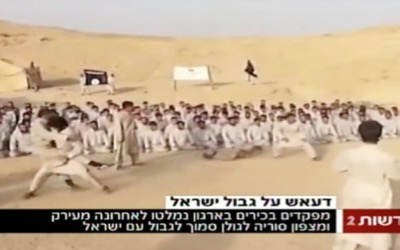
- France has been kept out of the loop by the United States in the formation of Daesh. It is surprised to discover that this new actor is upsetting its plans. It is a huge, over-equipped army. Here a training camp on the Israeli border.
Daesh and the Caliphate
A conflict arose within Al Qaeda. The Syrians of the Islamic State in Iraq, who had formed the Front for Victory (Arabic for “Jabhat Al-Nosra”), entered into a rivalry with their parent organization when the Iraqis of the Emirate also moved into Syria. When the conflict degenerated into a pitched battle, France and Turkey supported the Syrians against the Iraqis. Both countries sent ammunition to al-Nosra, via the empty shell that is the Free Syrian Army. However, the fighting between the two organizations was not widespread. Thus in Qalamoun (i.e., on the Lebanese border) it was always the same men who carried both flags.
When in May 2014, Turkey announced to France that it was participating with Saudi Arabia, the United States, Israel, Jordan, the Iraqi Kurdish Regional Government, Sunni tribes and the Iraqi Naqchbandi Order, as well as Norway in the preparation of a large operation with the Islamic Emirate in Iraq, the internal war stopped.
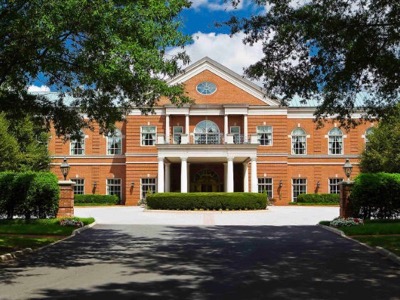
- Hillary Clinton and Barack Obama (then US presidential candidates) presented the strategic interest of the Muslim Brotherhood to the NATO think-tank, the Bilderberg Group, in 2008, during a meeting at the Marriott Hotel in Chantilly (USA).
France provided Special Forces and the multinational Lafarge. A brief look back is necessary here. In June 2008, NATO organized the annual meeting of the Bilderberg Group [5] in Chantilly (USA), during which Hillary Clinton and Barack Obama introduced themselves to the participants. Among the 120 present were Basma Kodmani (the future spokesperson for the Syrian National Coalition) and Volker Perthes (Feltman’s future assistant at the UN for Syria). During a debate on the permanence of US foreign policy, they intervened to present the importance of the Muslim Brotherhood and the role it could play in the “democratization” of the Arab world. Jean-Pierre Jouyet (the future secretary general of the Élysée), Manuel Valls (the future prime minister) and Bertrand Collomb (the boss of Lafarge) were present alongside Henry R. Kravis (the future financial coordinator of Daech and patron of Emmanuel Macron).
Let’s go back to our story. Lafarge is the world’s leading cement company. NATO, for which it had already secretly worked in 1991, entrusted it with the construction of bunkers for jihadists in Syria and the reconstruction of the Sunni part of Iraq. In exchange, Lafarge let the Alliance manage its installations in these two countries, in particular the Jalabiyeh plant (on the Turkish border, north of Aleppo). For two years, the multinational supplied the building materials for the gigantic underground fortifications that enabled the jihadists to challenge the Syrian Arab Army. Lafarge was now headed by the American Eric Olsen, who had integrated into the company the factories of the Sawiris brothers and Firas Tlass (the brother of General Manas Tlass, whom France had thought of making the next Syrian President). The links between Lafarge and the French Special Forces were facilitated by the friendship between Bertrand Collomb (who became honorary president of the multinational) and General Benoît Puga (who was still President Hollande’s chief of staff).
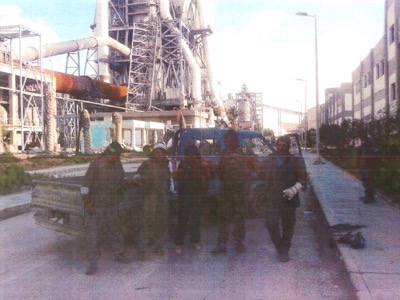
- The Lafarge factory in Jalabiyeh produced 6 million tons of cement to build Daesh’s numerous underground fortifications. At the same time, it housed NATO special forces (France, Norway, the United Kingdom and the United States). Here, Daesh soldiers in the factory.
When the online newspaper Zaman Al-Wasl [6] published evidence that Lafarge was paying money to Daesh, the daily Le Monde came to the rescue. It would publish its version of events, assuring that the multinational was paying for oil to run its plant. This was not true, as the plant ran mainly on coke, which was still being delivered from Turkey. However, Le Monde acknowledged, probably without realizing it, that Lafarge was building Daech’s fortifications insofar as it admitted that the 2.6 million tons of cement produced annually were destined for “rebel areas”.
The amount of cement produced by Lafarge for Daech – at least 6 million tons – was comparable to that used by the German Reich in 1916-17 to build the Siegfried Line. Since July 2012, it was therefore no longer a fourth-generation war masked as a revolution, but a classic war of position. This production would cease with the intervention of the Russian air force, solely able to destroy these bunkers. At that time, the Jalabiyeh factory would be transformed into the headquarters of the Nato Special Forces (United States, France, Norway, United Kingdom).
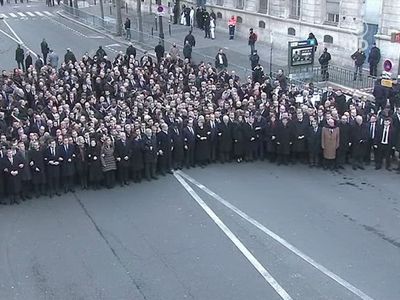
- On the sidelines of the “Je suis Charlie” demonstration on January 11, 2015, 56 heads of state and government gathered on a street adjacent to the procession and posed for a few minutes in front of the cameras before returning home. Based on these images, they were portrayed as leaders of a demonstration they never joined.
On January 7, 2015, two individuals dressed as military commandos and claiming to be al-Qaeda assassinated members of the editorial staff of the satirical weekly Charlie-Hebdo in Paris, while a third claiming to be a member of Daech killed a policewoman and took the customers of a kosher convenience store hostage. As usual since 9/11, the terrorists left clues to their identification, in this case identity papers. The government overplayed its reaction and the whole country gave in to stupor, then to fright. President Hollande and heads of state demonstrated with more than a million and a half French people shouting “We are all Charlie!” Among them, France’s main allies against Syria: Benyamin Netanyahu (Israel) and Ahmet Davutoglu (Turkey), who publicly support the jihadists. As I contested this staging and many people refused to “be Charlie”, the director of information of France2 Nathalie Saint-Criq intervened in the news to castigate the conspiracists that must be “identified, treated, integrated or reintegrated into the national community”. Later, we learn that the terrorists bought their weapons from an ex-mercenary working for the police [7] and that the investigation would be interrupted by the “secret Defense” [8], that two of them were trained by an agent of the DGSE [9], and that the heads of state posed separately for the photographers, but never marched in Paris. No matter, the government decreed a state of emergency, which was approved by the Parliament. It was extended not only to metropolitan France, but also to the overseas departments and territories. It was renewed four times and was always prolonged on the model of the USA Patriot Act.
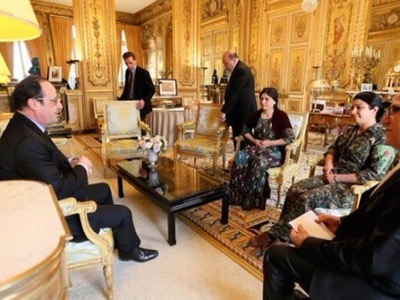
- Reneging on Alain Juppé’s commitments to create a Kurdistan in Syria, President François Hollande received a delegation of anti-Turkish PKK fighters at the Élysée Palace.
In application of the secret Juppé / Davutoglu Treaty, François Hollande envisaged the creation of a “Kurdistan” outside the historical Kurdish territories, he organized a secret meeting at the Élysée, on October 31, 2014, between his Turkish counterpart, Recep Tayyip Erdogan and the co-chairman of the Kurds of Syria, Salih Muslim, to whom he promised the presidency of the future state. However, when in early 2015, the other co-chair of the Syrian Kurds, Asya Abdullah, won the victory in Kobane and was praised by the United States, Hollande received her publicly on February 8, 2015, accompanied by another female officer in uniform.
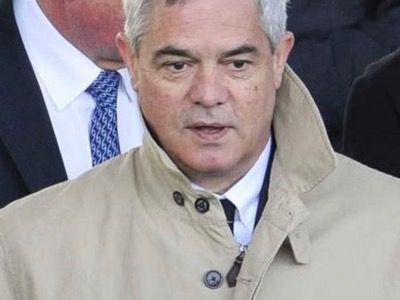
- Commissioner Patrick Calvar, Central Director of Internal Intelligence, confirms to deputies that he has identified the state that gave the order for the attacks of November 13, 2015 (the Bataclan). He would be careful not to name it. This revelation would be deleted from the official record of his hearing.
This turn of events provoked the fury of Erdogan, who ordered the November 13 attacks in Paris. On the second floor of the Bataclan, hostages were tortured and mutilated, others were decapitated. François Hollande sheepishly forbade the publication of this information, despite the fact that it was attested to by police officers before a parliamentary commission [10]. Patrick Calvar, the central director of counter-espionage, testified before a parliamentary commission that his services had identified the ordering state. Shirking his responsibilities, the President would organize tearful commemoration ceremonies and persuade his fellow citizens that terrorism is an inevitable scourge. He will institute a medal of “recognition to the victims of terrorism”, and will compensate the “prejudice of anguish of imminent death” and even the “prejudice of waiting”. But he will not take any action against Turkey. Turkey will order another crime, five months later, against Belgium at Brussels-Zaventem airport and in front of the European Commission headquarters, at the exact place where the PKK had just demonstrated.
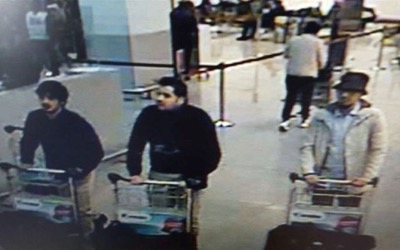
- The British press reveals that Mohammed Abrini, the only Daesh soldier involved in both the Paris and Brussels attacks, is an informer for Her Majesty’s Secret Service (MI6).
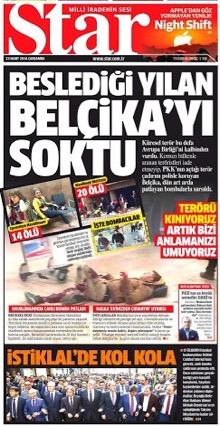 Special edition of Star (close to the AKP) on March 23, 2016 titled: “The snake that Belgium was feeding in its bosom bit her,” referring to President Erdogan’s speech on March 18
Special edition of Star (close to the AKP) on March 23, 2016 titled: “The snake that Belgium was feeding in its bosom bit her,” referring to President Erdogan’s speech on March 18- Far from hiding his responsibility, Recep Tayyip Erdogan gave a resounding speech at the ceremonies marking the 101st anniversary of the battle of Çanakkale (“the battle of the Dardanelles”), four days before the attacks on Belgium [11]. He accused the Europeans of supporting the PKK and announced what would happen in Brussels. The day after the attack, the AKP press (Star, Akit, Internethaber) claimed that the Europeans only got what they deserved [12].To give the impression that it is taking the initiative against Daech, France deploys the aircraft carrier Charles-de-Gaulle, successively in February/March and November/December 2015. It was escorted by an impressive armada and equipped with 32 aircraft (drones, helicopters and planes). During its second mission, President Hollande went on board and emphasized that the ship will command a large-scale international force. In reality, the French were integrated into Task Force 50 of the US NavCent, i.e. the fleet of the US Central Command. Although the sixty or so ships are commanded by Rear Admiral René-Jean Crignola, he is placed under the authority of the commander of the Fifth Fleet, Vice Admiral Kevin Donegan, who in turn is under the orders of General Lloyd J. Austin III, commander of CentCom. It is indeed an absolute rule of the Empire that command of Allied operations always falls to U.S. officers, with the Europeans being merely deputies.
At the end of 2015, France sent its Prime Minister, Manuel Valls, to collect easy money in Saudi Arabia. There is renewed talk of 3 billion in orders for the Lebanese army and 10 billion in other contracts. But the Saudis are furious about the Iranian nuclear agreement – which the French had pledged to sabotage – and do not appreciate Paris’s hesitations in Syria. The French are proving to be costly and ineffective vassals. The harvest will therefore be much smaller than expected and so will the “gifts.”
In early 2016, the French did not flinch when François Hollande appointed Laurent Fabius as president of the Constitutional Council. Thus they cut in this with the Iranians. They received him after the signing of the nuclear agreement with the 5+1. He was hoping to establish business relations even though he had tried to sabotage the agreement for years and confessed, during a dinner, to having spied for Israel, to which he transmitted an account of the negotiations as they went along. He was therefore welcomed with the protocol honors due to his rank by the authorities, while revolutionary associations demonstrated on his way, from his arrival at the airport to his departure. They held up signs recalling his responsibility for the death of more than 2,000 hemophiliacs in 1985-86, as well as his support for al-Qaeda, which “did a good job” killing tens of thousands of Syrians.
Jean-Marc Ayrault replaced him as Minister of Foreign Affairs. Very concerned about the growing gap between France and Germany, he devoted his energy to avoiding their separation. In doing so, he sacrificed the Syrian file and, after a few weeks of hesitation, decided to hold the positions of his predecessors, Juppé and Fabius.
Ayrault has no relationship with the new Prime Minister, Manuel Valls, and deals directly with François Hollande who himself takes charge of the Syrian issue.
If Ayrault is a moderate supporter of Israel, Valls is much harder on the issue. He thus came into conflict with President Hollande over the archaeological work undertaken by Tel Aviv in Jerusalem to the detriment of Muslim monuments. Once committed to the Palestinian cause, he attributes his reversal to his marriage to the Jewish violinist Anne Gravoin.
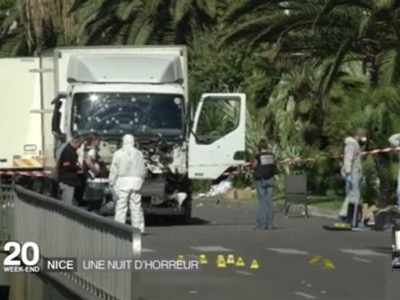
- In Nice, a new attack kills 86 people and injures 484. President Hollande continues to lie to his fellow citizens to hide his responsibility. The French still do not understand the consequences of what is being done in their name in Syria.
On the national holiday, the evening of July 14, 2016, an individual claiming to be a member of Daech, Mohamed Lahouaiej-Bouhlel, crushed random passersby with a truck on the Promenade des Anglais, killing 86 people and injuring 484. Although no one has ever succeeded in killing and injuring so many people with a vehicle, investigators assure that the man had no special training and was acting alone. However, his family in Tunisia had just received 100,000 euros, without any attempt to find out who paid for this crime. While we are in a state of emergency, it appears that the terrorist was able to act all the more easily as 60 gendarmes had been moved from Nice to Avignon to ensure the security of President Hollande who was dining with his mistress and actors.
In Paris, the jihadists’ breakthrough in Syria is commented on by stressing that the regime now controls only 20% of the territory and will soon fall. In reality, two thirds of Syria is a desert that nobody controls, neither the Republic nor the jihadists. President al-Assad has chosen to defend his population rather than his territory. At least 8 million Syrians have chosen to flee the jihadists and take refuge in the cities of the Republic. None of them is known to have made the reverse journey: from government zones to those of the jihadists.
So François Hollande was seized with fury when, in February 2015, he learned of the trip to Damascus of two senators, Jean-Pierre Vial (Les Républicains) and François Zocchetto (centrist), and two deputies, Jacques Myard (Les Républicains) and Gérard Bapt (PS). A second trip, in September 2015, brought Gérard Bapt again, this time accompanied by deputies Jérôme Lambert (PS) and Christian Hutin (Chevènementiste). Then a third, in March 2016, brings together deputies (Les Républicains) around Thierry Mariani, with Valérie Boyer, Nicolas Dhuicq, Denis Jacquat and Michel Voisin. And finally a fourth, in January 2017, with the same and Jean Lassalle (centrist). All, except Gérard Bapt, are received by President el-Assad.
It is that the socialist Bapt, too, came to do business. He represented the Grand Lodge of the French Masonic Alliance (GLAMF) – directly dependent on Prince Edward, Duke of Kent -, a spin-off of the French National Grand Lodge (GLNF), created by Alain Juillet (former head of Economic Intelligence at the General Secretariat of National Defense) for the British. He meets with businessmen and promises them to have their names removed from the European sanctions list, in exchange for cash. Of course he has no power in this matter. He is accompanied by another crook, Jérôme Toussaint, now imprisoned in France.
The third trip highlights the presence in Syria of the association SOS Chrétiens d’Orient, which recruits mainly from the National Front. If its volunteers devote themselves without counting the cost – at their own expense -, their activity in favor of only Christians linked to Rome discriminates against the Orthodox. The millions of euros they claim to collect in France do not reach Syria. The local religious authorities began to get angry when these Western Christians, reviving the spirit of the Crusades, celebrated a mass in the ruins of the Krak des Chevaliers, the imposing 12th century Crusader fortress. The young people were unaware that at the time, the Christians of the Levant had defended their country against the Crusader invaders, whom they considered to be imperialist conquerors.
In the end, as France sank into decline, its leaders failed to form an anti-imperialist front, which was an essential precondition for economic recovery. Only a few groups are taking a stand against this colonial war: Marine Le Pen’s National Front, Jean-Frédéric Poisson’s Christian Democratic Party, Nicolas Dupont-Aignan’s Debout la France, François Asselineau’s Union populaire républicaine, the group of Republicans close to François Fillon and Jean-Luc Mélenchon’s France Insoumise.
Deprived of information from the field since the closure of its embassy, unable to analyze the origin of the events, but still trying to pretend that it is initiating them, France has obviously not foreseen what will follow.
(To be continued…)
https://www.voltairenet.org/article213695.html
List of other episodes:
[1] “France guilty of prohibiting the Syrian Presidential election”, by Damien Viguier, Translation Anoosha Boralessa, Voltaire Network, 20 May 2014.
[2] “Tumult in Beirut for Syrian presidential election”, Voltaire Network, 30 May 2014.
[3] “73.42% of Syrians turned out for presidential election”, Voltaire Network, 5 June 2014.
[4] Les Proies : dans le harem de Kadhafi, Annick Cojean, Grasset (2012).
[5] “What you don’t know about the Bilderberg-Group”, by Thierry Meyssan, Komsomolskaïa Pravda (Russia) , Voltaire Network, 9 May 2011.
[6] “Lafarge-Holcim e-mails”, Voltaire Network, March 24, 2017.
[7] « Les armes pour Charlie-Hebdo ont été vendues par un ex-combattant volontaire croate », par Marijo Kavain, Traduction Svetlana Maksovic, Slobodna Dalmacija (Croatie), Réseau Voltaire, 14 janvier 2016.
[8] «Attentats contre Charlie Hebdo: la connexion Claude Hermant – Amedy Coulibaly couverte par le secret de la Défense nationale», Alexis Kropotkine, Greffier noir, 17 septembre 2015. « Les armes de Charlie-Hebdo couvertes par le Secret-Défense », Réseau Voltaire, 17 septembre 2015.
[9] “Elements of the Coulibaly affair recall the role of the French services in 1999”, by Thierry Meyssan, Alexis Kropotkine, Translation Pete Kimberley, Voltaire Network, 3 June 2015. “Concerning my interview about the Hermant-Coulibaly affair”, by Thierry Meyssan, Translation Pete Kimberley, Voltaire Network, 7 June 2015.
[10] Rapport fait au nom de la Commission d’enquête parlementaire relative aux moyens mis en œuvre par l’État pour lutter contre le terrorisme depuis le 7 janvier 2015 (2 Vol.), sous la présidence de George Fenech, Assemblée nationale, 5 juillet 2016.
[11] “Erdoğan threatens the European Union”, by Recep Tayyip Erdoğan, Translation Pete Kimberley, Voltaire Network, 18 March 2016.
[12] « La Turquie revendique le bain de sang de Bruxelles », par Savvas Kalèndéridès, Traduction Christian Haccuria, Réseau Voltaire, 24 mars 2016.
 TheAltWorld
TheAltWorld 
0 thoughts on “France, against its adversaries and its allies-16”